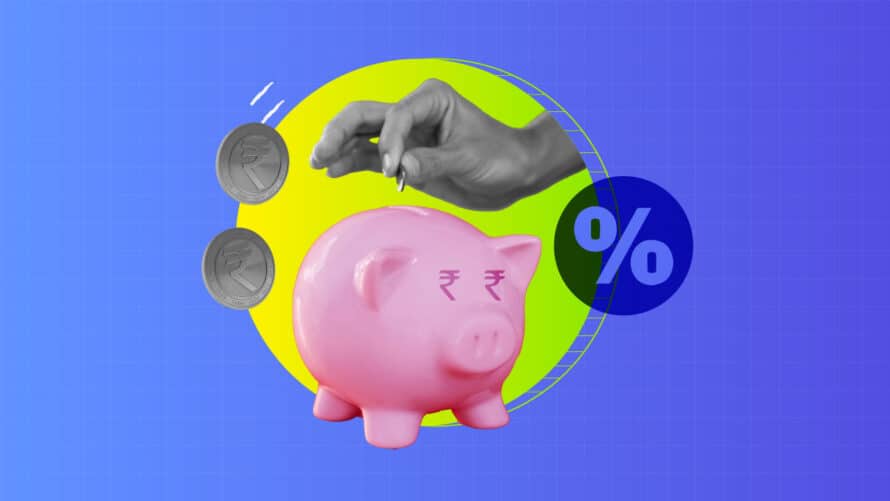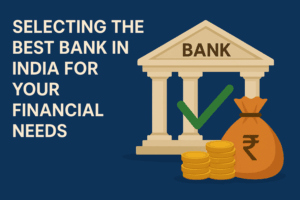
Opening a bank account sounds easy, especially if it is a savings account. Yet, as with anything financial, the process demands some due diligence. Digital banking facilities and interest rates offered should be the foremost criteria for choosing the best bank account in India, not to mention the quality of customer service and minimum balance requirement. Let’s understand how to choose the best bank for savings account in India.
What are the best savings bank accounts?
Picking the best savings bank accounts in India for 2025 depends on several factors. Competitive interest rates rank number one in the list, followed by low or no maintenance fees, and digital banking solutions.
Strong customer service and user-friendly online and mobile banking interfaces also matter for customers. Dependability and security are the top requirements of account holders.
The best savings bank accounts fulfill these customer needs, match personal financial objectives, and provide a pleasant banking experience overall.
Best savings bank accounts of 2025
Competitive features mark the best savings bank accounts in India for 2025. Top banks offer competitive interest rates and almost nil maintenance fees to entice account holders. Features like zero-balance accounts appeal to users.
The best savings accounts of 2025 cater to user demands ranging from high-yield savings to some handholding in financial matters. Business customers typically look for overdraft facility and competitive foreign exchange rates. At the very least, users expect savings bank accounts to offer competitive interest rates and easy online banking. The table below lists banks that offer competitive savings bank interest rates.
| Bank | Rate of Interest | Min. Account Balance |
| Kotak Mahindra | 3.50%-4.00% | Rs. 10,000 |
| RBL Bank | 4.25%-6.75% | Rs. 5,000 per month for standard savings accounts |
| SBI | 2.70%-3.00% | Nil |
| HDFC Bank | 3.00-3.50% | Rs. 2,500 to Rs. 10,000, based on location |
| ICICI Bank | 3.00% | Rs. 1,000 to Rs. 10,000 based on location |
How to choose the best bank for savings account
We have compiled a checklist that will help you pick the best bank for savings account in India.
- Interest rate: This is an important consideration. Compare the interest rates offered by different banks and take your pick.
- Minimum balance: Check the minimum balance requirement.
- Withdrawal charges: Some banks impose limits on the number of ATM cash withdrawals. So, look out for those charges.
- Fees: Search for charges on idle accounts, monthly upkeep fees, and ATM fees, especially if you use out-of-network ATMs.
- Customer service: Responsive customer service is required for smooth resolution of issues.
- Accessibility: Accessibility relates to branch location and ATM networks. If you prefer internet banking, a user-friendly mobile app is a bonus.
- Perks: Some banks run rewards programs, cashback on debit card purchases, or discounts on other financial transactions.
An overview of the top savings bank accounts of 2025
The best savings accounts in 2025 will have a healthy mix of useful features, minimum account balance, and competitive interest rates. Salary accounts from banks like HDFC Bank, ICICI Bank, and SBI often offer competitive interest rates and waive minimum balance requirements. Some banks have specific offers like health insurance to senior citizens at reduced premiums. Look for public banks with extensive ATM networks or online-focused private banks that offer good interest rates and charge modest fees.
Types of savings accounts
Banks offer a variety of savings accounts to cater to varying customer requirements. Some of them are listed below.
a. Regular savings account:
It is ideal for savers. A regular savings account offers competitive interest rates on balances.
b. Salary-based savings account:
Salary-based savings accounts do not require you to maintain a minimum balance, provide bigger transaction limits, and often have special offers on loans and other banking products for account holders.
c. Senior Citizens savings accounts:
These accounts offer higher interest rates, low or no minimum balance necessities, and other advantages like health insurance coverage.
d. Minors’ Savings Accounts:
Usually managed by guardians, these accounts seek to improve financial literacy and cultivate saving habits from a young age.
e. Zero Balance Savings Account:
Designed for people who can’t afford to keep a minimum account balance, these accounts give essential banking services without financial limits by waiving penalties related to low balances.
f. Women’s Savings Account:
Designed to enable women financially, women’s savings accounts usually offer higher interest rates, higher limits on loans or insurance, and specific banking privileges.
Eligibility criteria to open a savings account
To open a savings account in India, an individual must meet specific bank eligibility criteria. The applicant should be a resident of India, or a foreign national with a valid visa, and meet the minimum age requirement. Applicants are expected to present identification documents like Aadhaar card, PAN card, passport, and driver’s license. Some banks have specific documentation prerequisites or criteria for specific account types, such as salary-based accounts or accounts for minors.
Documents needed to open a savings bank account
Opening a savings account is fairly simple if you have the required documents. Many banks demand proof of address. Make sure to submit your PAN card and a photograph, except for basic accounts. All this is part of the KYC requirements for opening a savings bank account.
Benefits of opening a savings account
Opening a savings account offers several benefits such as the following:
- Earnings from interest: Savings accounts accumulate interest on deposited funds, allowing your money to expand over the long run. Regular building of this interest augments your savings minus any additional work.
- Safety and security: Supported by regulatory safeguards, banks offer a protected environment for your money. Under schemes like Deposit Insurance and Credit Guarantee Corporation (DICGC) in India, deposits in savings accounts are protected up to a specific limit.
- Financial convenience: A savings account is your gateway to many value-added services. It offers fund transfers, ATM withdrawals, online and mobile banking, and an assortment of banking services in general.
Conclusion
The best bank to open a savings account in India in 2025 will be the one that offers competitive interest rates, minimal service charges, and digital banking. Picking a bank that aligns with individual financial goals is important.
FAQs
Q: What are the limits (minimum and maximum) for savings bank accounts?
The bank you choose and the account type will determine the minimum balance requirements. Some accounts do not require any minimum account balance to be maintained, while some would insist on a small amount. However, a few banks may cap them for basic savings accounts, while the maximum deposit limit in a savings account in a financial year is Rs. 10 lakhs.
Q: How can I get the interest earned on my savings bank account?
Interest earned is credited to your account regularly, usually quarterly or monthly. Retaining it in your account or withdrawing it along with your principal balance will allow you to access the earned interest.
Q: Which bank gives 7% interest on a savings account?
Currently, AU Small Finance Bank, Equitas Small Finance Bank, and Suryoday Small Finance Bank pay interest of 7 percent and above on savings accounts for balances above a certain threshold. For Equitas, the threshold is Rs. 7 lakhs.
Q: Is a savings account high-risk?
Savings accounts are generally considered safe investments. Subject to a certain amount, the government guarantees your money, protecting it should the bank fail.
Q: What are the various savings account services available via phone banking?
You can view your balance, move money between accounts, or ask for account statements by using phone banking to access your savings account. Certain banks may also provide phone banking to stop payment demands or bill payments.
Q. How much tax-free deposit can I make in my Indian savings account?
As per Reserve Bank of India guidelines, the cash deposit limit in a savings account in a financial year is capped at Rs. 10 lakh. Your bank is required to report any transaction that exceeds this limit.
Q. In India, how much of the money in a savings account is taxable?
The interest you earn from your savings account is taxable. However, Section 80TTA of the Income Tax Act provides a deduction of Rs. 10,000 on interest income. In short, you need to pay tax only if your interest income crosses Rs. 10,000 in a financial year.
Q. Which bank offers the highest return on a savings account?
Account type, minimum balance requirements, and promotional offers can impact interest rates. You can find accounts with competitive interest rates that satisfy your needs if you do your research.







